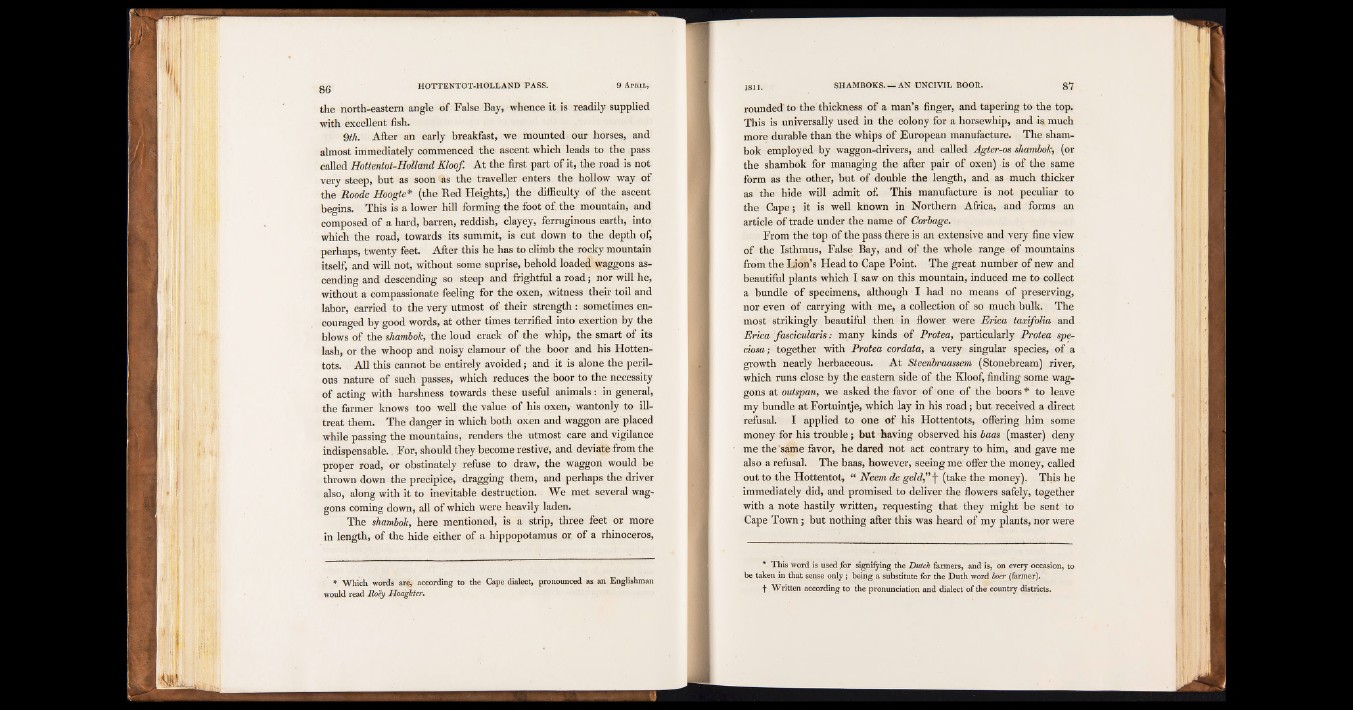
the north-eastern angle of False Bay, whence it is readily supplied
with excellent fish.
9th. After an early breakfast, we mounted our horses, and
almost immediately commenced the ascent which leads to the pass
called Hottentot-Holland Kloof. At the first part of it, the road is nof
very steep, but as soon as the traveller enters the hollow way of
the Roode Hoogte* (the Red Heights,) the difficulty of the ascent
begins. This is a lower hill forming the foot of the mountain, and
composed of a hard, barren, reddish, clayey, ferruginous earth, into
which the road, towards its summit, is cut down to the depth of,
perhaps, twenty feet. After this he has to climb the rocky mountain
itself, and will not, without some suprise, behold loaded waggons ascending
and descending so steep and frightful a road ; nor will he,
without a compassionate feeling for the oxen, .witness their toil and
labor, carried to the very utmost of their strength : sometimes encouraged
by good words, at other times terrified into exertion by the
blows of the shambok, the loud crack of the whip, the smart of its
lash, or the whoop and noisy clamour of the boor and his Hottentots.
All this cannot be entirely avoided ; and it is alone the perilous
nature of such passes, which reduces the boor to the necessity
of acting with harshness towards these useful animals : in general,
the farmer knows too well the value of his oxen, wantonly to ill-
treat them. The danger in which both oxen and waggon are placed
while passing the mountains, renders the utmost care and vigilance
indispensable.. For, should they become restive, and deviate from the
proper road, or obstinately refuse to draw, the waggon would be
thrown down the precipice, dragging them, and perhaps the driver
also, along with it to inevitable destruction. We met several waggons
coming down, all of which were heavily laden.
The shambok, here mentioned, is a strip, three feet or more
in length, of the hide either of a hippopotamus or of a rhinoceros,
*. "Which words are, according to the Cape dialect, pronounced as an Englishman
would read Uoey Hoarder.
rounded'to the thickness of a man’s finger, and tapering to the top.
This is universally used in the colony for a horsewhip, and is much
more durable than the whips of Furopean manufacture. The shambok
employed by waggon-drivers, and called Agter-os shambok, (or
the shambok for managing the after pair of oxen) is of the same
form as the other, but of double the length, and as much thicker
as the hide will admit of. This manufacture is not peculiar to
the Cape; it is well known in Northern Africa, and forms an
article of trade under the name of Corbage.
From the top of the pass there is an extensive and very fine view
of the Isthmus, False Bay, and of the whole range of mountains
from the Lion’s Head to Cape Point. The great number of new and
beautiful plants which I saw on this mountain, induced me to collect
a bundle of specimens, although I had no means of preserving,
nor even of carrying with me, a collection of so much bulk. The
most strikingly beautiful then in flower were Erica taxifolia and
Erica fasdcularis: many kinds of Protea, particularly Protea spe-
ciosa; together with Protea cordata, a very singular species, of a
growth nearly herbaceous. At Steenbraassem (Stonebream) river,
which runs close by the eastern side of the Kloof, finding some waggons
at outspan, we asked the favor of one of the boors* to leave
my bundle at Fortuintje, which lay in his road; but received a direct
refusal. I applied to one of his Hottentots, offering him some
money for his trouble; but having observed his baas (master) deny
me the same favor, he dared not act contrary to him, and gave me
also a refusal. The baas, however, seeing me offer the money, called
out to the Hottentot, “ Neem de geld," f (take the money). This he
immediately did, and promised to deliver the flowers safely, together
with a note hastily written, requesting that they might be sent to
Cape Town; but nothing after this was heard of my plants, nor were
% This word is used /o r signifying the Dutch farmers, and is, on every occasion, to
be taken in that sense o nly; being a substitute for the Duth word boer (former).
+ Written according to the pronunciation and dialect of the country districts.